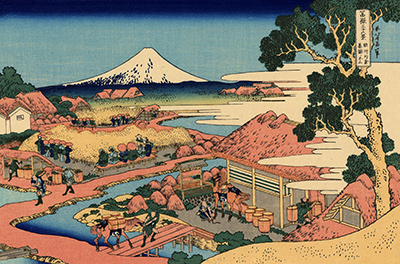Hokusai
The Tea plantation of Katakura in Suruga Province by Hokusai
The Tea Plantation of Katakura in Suruga Province is a brilliant woodblock painting depicting the entire workings of the tea plantation. The picture is less about a landscape depiction of the tea plantation itself and more about the daily life in it. The print is one of a series of woodblock prints called Thirty Six Views of Mount Fuji.
Despite its name, the series however has 46 blocks, since ten were added at a later date to the series. The Tea Plantation of Katakura in Suruga Province is among those added subsequently. Katsushika Hokusai was a Japanese artist, renowned during the Edo period for his paintings, prints, and woodblocks. His block prints are especially famous. He studied wood block printing from Katsukawa Shunshō and published his first prints in 1779. His series, One Hundred Views of Mount Fuji, is generally considered a masterpiece.
The painting shows workers dominating the landscape, doing various chores. Some are picking the leaves, while others are sorting through them. There are workers who are transporting the loads on their backs. Horses are also employed in the transportation of the tea. The importance of horses in the tea industry is shown by a man grooming a horse in its stable, while a few barrels of tea stored in a corner. The background of the picture is as evocative as the foreground and its details. A river runs through the plantation, and probably provides irrigation for the plants.
Far in the distance, Mount Fuji dominates the skyline. The prevalence of the mountain in Hokusai’s works has a religious significance since Mount Fuji is a representation of immortal and eternal life in Japanese Buddhism. Hokusai was a Buddhist of the Nichiren sect and hence gave special attention to the sacred mountain in his various art works. The Tea Plantation of Katakura in Suruga Province was originally created in 1830. There have been exhibitions of this block print, along with the other forty five. Currently, it is in the collection of Museum of Fine Arts in Boston, USA.
